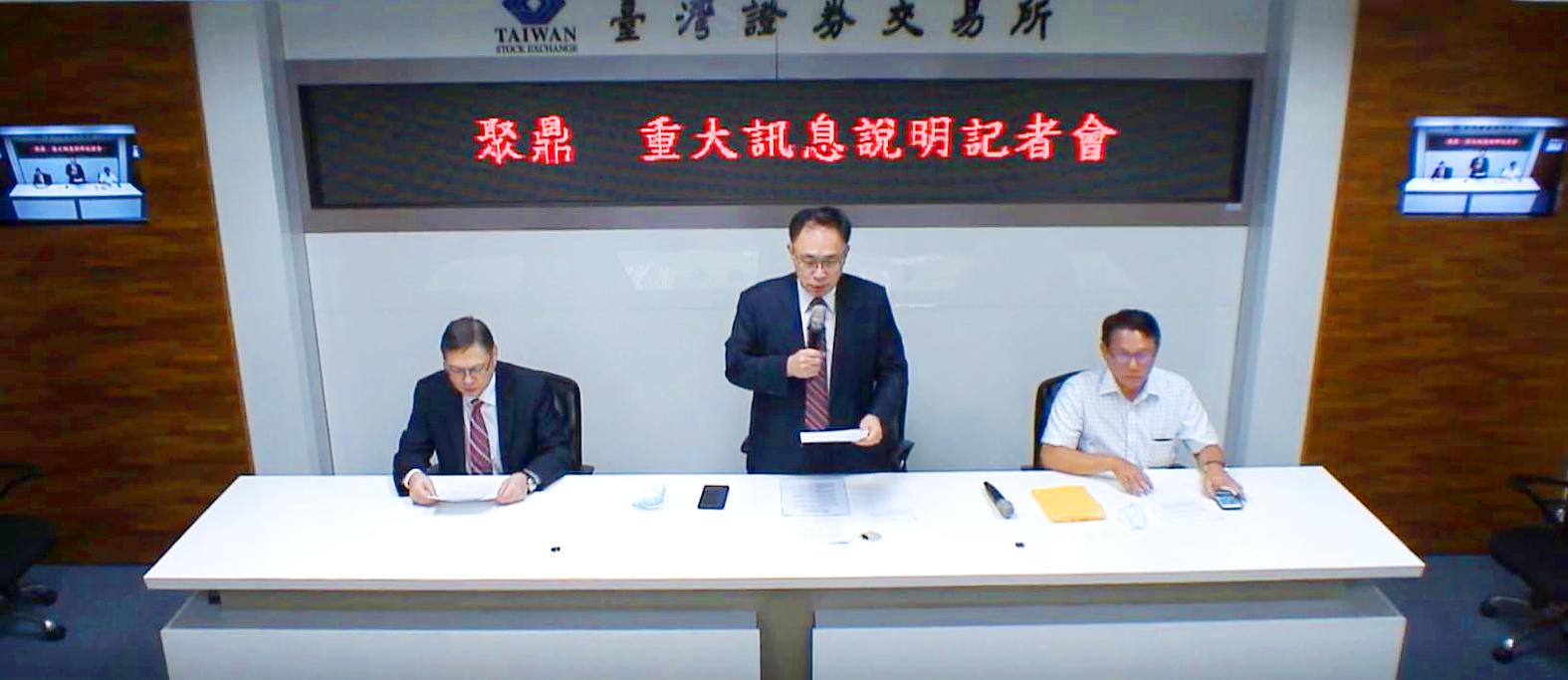Polytronics Technology Corp (聚鼎科技) yesterday announced that it is buying Henkel AG’s thermal clad dielectric material (TCLAD) business division for US$26 million as the Taiwanese firm aims to improve its technology, product portfolio and revenue performance.
Polytronics, headquartered in the Hsinchu Science Park (新竹科學園區), is a supplier of protection components and heat dissipation materials. The firm entered the metallic heat-dissipation substrate market in 2007 and developed a unique solventless production process.
Its board of directors approved signing an agreement with Henkel to acquire the German chemical firm’s TCLAD division in the US.

Photo courtesy of Taiwan Stock Exchange Corp
The purchase includes all assets and business interests, including equipment, know-how, patents, trademarks, materials, merchandise and factories in Prescott, Wisconsin, Polytronics said.
The deal would include continuing the contracts of 273 existing employees and ongoing client relationships, but not debts, it said.
Through the deal, Polytronics expects to form a joint research and development platform, secure customers and sales channels, and explore new markets, such as aerospace and defense, to elevate its competitiveness and efficiency, it said in a regulatory filing.
“If synergy is achieved after post-close integration, there would be positive impacts on [Polytronics’] net value per share and net profit per share,” the company said in the filing. “If this deal is approved by the Committee on Foreign Investment in the US, the closing of the transaction will occur in the fourth quarter of 2020 or the first quarter of 2021.”
Calling the deal a marriage of two strong partners, Polytronics chairman Edward Chu (朱復華) said that he anticipates a 50 percent increase in revenue and a 15 percent increase in profit for Polytronics next year.
The company’s main products include polymeric positive temperature coefficient thermistors, transient voltage suppressors, thyristor surge suppressors, thermal panels for LED lighting and backlighting, as well as LED lamps, according to its Web site.

UNCERTAINTY: Innolux activated a stringent supply chain management mechanism, as it did during the COVID-19 pandemic, to ensure optimal inventory levels for customers Flat-panel display makers AUO Corp (友達) and Innolux Corp (群創) yesterday said that about 12 to 20 percent of their display business is at risk of potential US tariffs and that they would relocate production or shipment destinations to mitigate the levies’ effects. US tariffs would have a direct impact of US$200 million on AUO’s revenue, company chairman Paul Peng (彭雙浪) told reporters on the sidelines of the Touch Taiwan trade show in Taipei yesterday. That would make up about 12 percent of the company’s overall revenue. To cope with the tariff uncertainty, AUO plans to allocate its production to manufacturing facilities in

Taiwan will prioritize the development of silicon photonics by taking advantage of its strength in the semiconductor industry to build another shield to protect the local economy, National Development Council (NDC) Minister Paul Liu (劉鏡清) said yesterday. Speaking at a meeting of the legislature’s Economics Committee, Liu said Taiwan already has the artificial intelligence (AI) industry as a shield, after the semiconductor industry, to safeguard the country, and is looking at new unique fields to build more economic shields. While Taiwan will further strengthen its existing shields, over the longer term, the country is determined to focus on such potential segments as

COLLABORATION: Given Taiwan’s key position in global supply chains, the US firm is discussing strategies with local partners and clients to deal with global uncertainties Advanced Micro Devices Inc (AMD) yesterday said it is meeting with local ecosystem partners, including Taiwan Semiconductor Manufacturing Co (TSMC, 台積電), to discuss strategies, including long-term manufacturing, to navigate uncertainties such as US tariffs, as Taiwan occupies an important position in global supply chains. AMD chief executive officer Lisa Su (蘇姿丰) told reporters that Taiwan is an important part of the chip designer’s ecosystem and she is discussing with partners and customers in Taiwan to forge strong collaborations on different areas during this critical period. AMD has just become the first artificial-intelligence (AI) server chip customer of TSMC to utilize its advanced

While China’s leaders use their economic and political might to fight US President Donald Trump’s trade war “to the end,” its army of social media soldiers are embarking on a more humorous campaign online. Trump’s tariff blitz has seen Washington and Beijing impose eye-watering duties on imports from the other, fanning a standoff between the economic superpowers that has sparked global recession fears and sent markets into a tailspin. Trump says his policy is a response to years of being “ripped off” by other countries and aims to bring manufacturing to the US, forcing companies to employ US workers. However, China’s online warriors